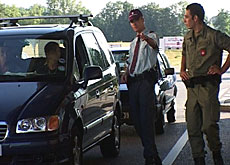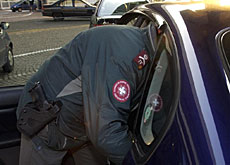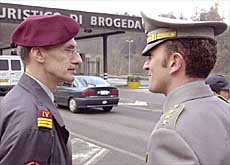Border guards risk new dangers

The job of guarding Switzerland’s borders is becoming increasingly dangerous, with customs officials frequently being subjected to threats and physical violence.
The alpine country has nearly 1,900 kilometres of frontier to patrol, but only a third of the 105 border posts are manned 24 hours per day.
The dearth of border guards is partly due to a recruitment crisis. New recruits earn between SFr3,000 and SFr 4,000 net – SFr1,500 less than their cantonal police counterparts.
At the same time, their workload is growing. The growth of organised crime has led to an increase in hard drugs and people smuggling. The guards – and sometimes even their families – are at risk.
Fatal attacks
Three years ago, an official died after being mown down by a driver passing his customs post in Geneva.
More recently, a simple border inspection last year in the Ticino town of Chiasso had fatal repercussions. A Romanian vowed revenge on a customs official, after getting into a fight with him. While the guard was away from home, his wife was murdered in her apartment.
Last year, there were reportedly 48 attacks on border guards around the country. The government reacted this year by doubling the number of fortification guards stationed at border posts to protect customs officials.
At the Anières border post between Geneva and France, Harvey Findeisen carries out checks on dozens of vehicles every day.
With between 5,000 and 10,000 vehicles passing through, this is one of the busiest borders in the country, and Findeisen has to be ready for anything.
Hi-tech checks
The skills required to carry out the job efficiently are increasingly technology-based. Inside the customs office is a row of computers for checking the validity of passports, cross-referencing ID papers with central and international police records, and checking car registration details for theft or motoring offences.
“If Bin Laden tries to get through this border, we have all his details from Interpol,” the guard pointed out.
Findeisen has recently made two arrests for suspected passport forgery. He keeps suspects detained in a small jail in the customs house, until the police arrive.
Often, asylum seekers do not have ID papers, and are requested to give their fingerprints. Digital copies are sent to Bern to establish whether the person in question has applied for asylum in Switzerland, in which case they are not permitted to leave.
Those who have already applied for asylum in France are generally sent back there.
Smuggling
Findeisen also has to keep a look out for illegal weapons. Blades over 5cm, electric shock machines and shackles are all forbidden. If they are found they are confiscated, and their owners can expect to be fined.
Another part of the job is selling motorway permits, and collecting customs duties.
Many Swiss people shop for groceries in France, as it’s cheaper. If they return with more than 500g of meat per person or three litres of alcohol, they are liable to pay duties.
Asked how hard it is to spot cheats, Findeisen commented: “You learn with experience to sense who’s cheating. You can see it in their facial expressions. Sometimes they don’t look you in the eyes.”
Findeisen clearly enjoys his work, although he admits it’s full of surprises. “When you stop a car, you never know who’s in it.
It may look like a family, but the driver – playing the husband role – may be a criminal and the others may not even be related. So you always have to be well prepared.”
Spot check
Findeisen breaks off the discussion to inspect a French car carrying three young professionals towards a Swiss alpine retreat. A meticulous search ensues for drugs, weapons and other illegal imports.
Car seats are pulled out and the boot is completely emptied. The driver and his passengers turn out their pockets and hand over their mobile phones.
A quick computer check establishes that these are not stolen, and the French visitors leave the post with a friendly wave.
Findeisen smiles as he ends another shift. Once again, he has managed to avoid physical and verbal abuse, but one wonders just how long his luck will hold out.
swissinfo, Julie Hunt on the Swiss/French border
In the first half of 2003, seven guards were attacked, forcing some to either fire shots or use pepper spray.
Nearly 17,000 people were arrested on charges ranging from non-payment of fines to suspected murder.
Guards turned back more than 4,000 illegal immigrants, a quarter more than in the same period in 2002.
They seized more than double the amount of smuggled cocaine – in total, 46 kilos.
Smuggling of other items increased by about 5.5%, with 6,720 cases reported.
swissinfo spent the day with a guard at one of Switzerland’s busiest borders, to find out how patrols are coping with an increased workload, and what means they have at their disposal to deal with a flood of illegal immigrants, and increased smuggling.

In compliance with the JTI standards
More: SWI swissinfo.ch certified by the Journalism Trust Initiative




You can find an overview of ongoing debates with our journalists here. Please join us!
If you want to start a conversation about a topic raised in this article or want to report factual errors, email us at english@swissinfo.ch.